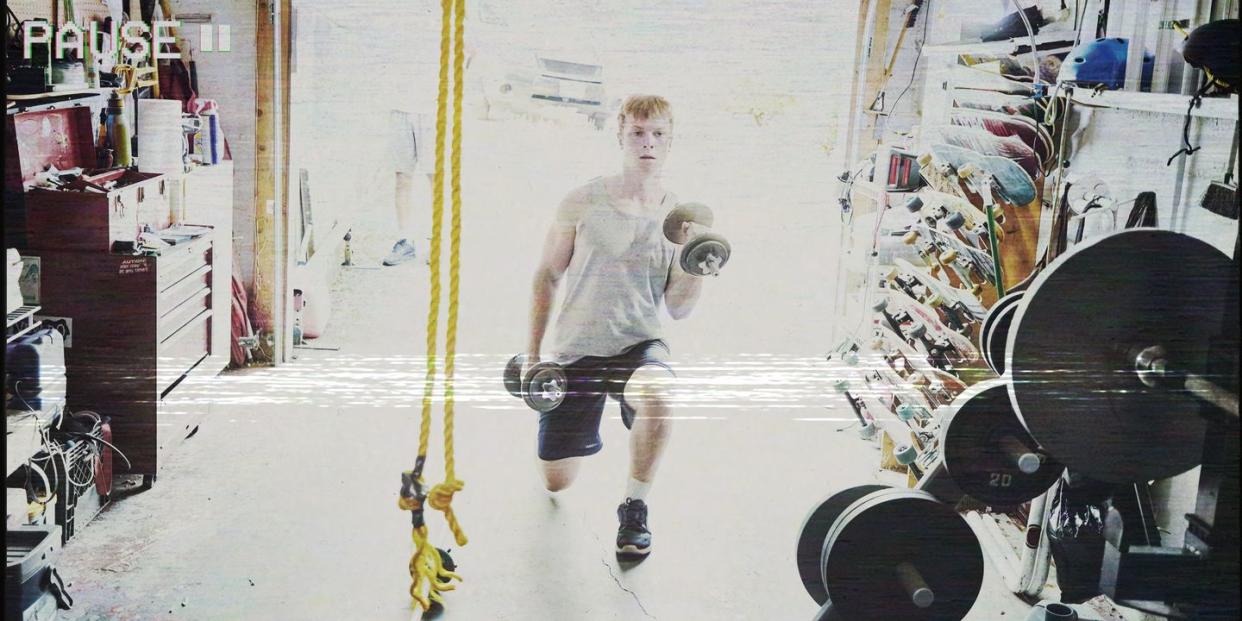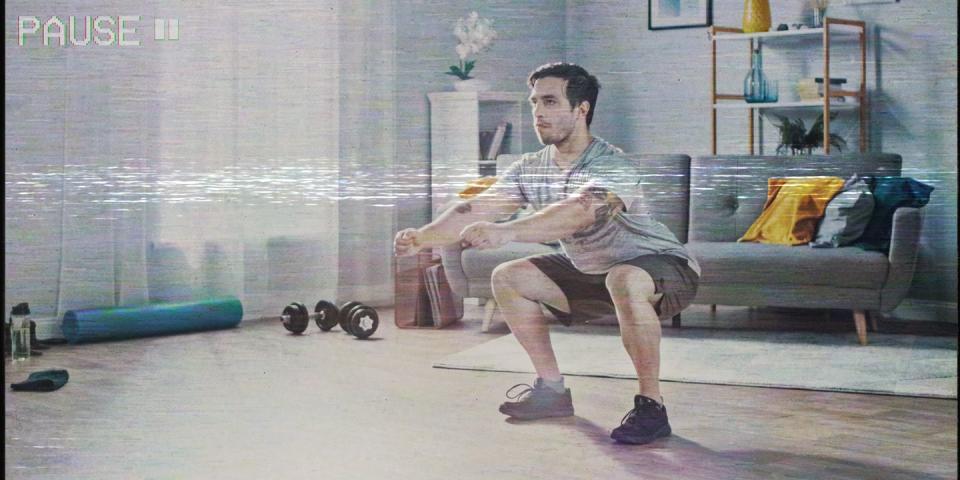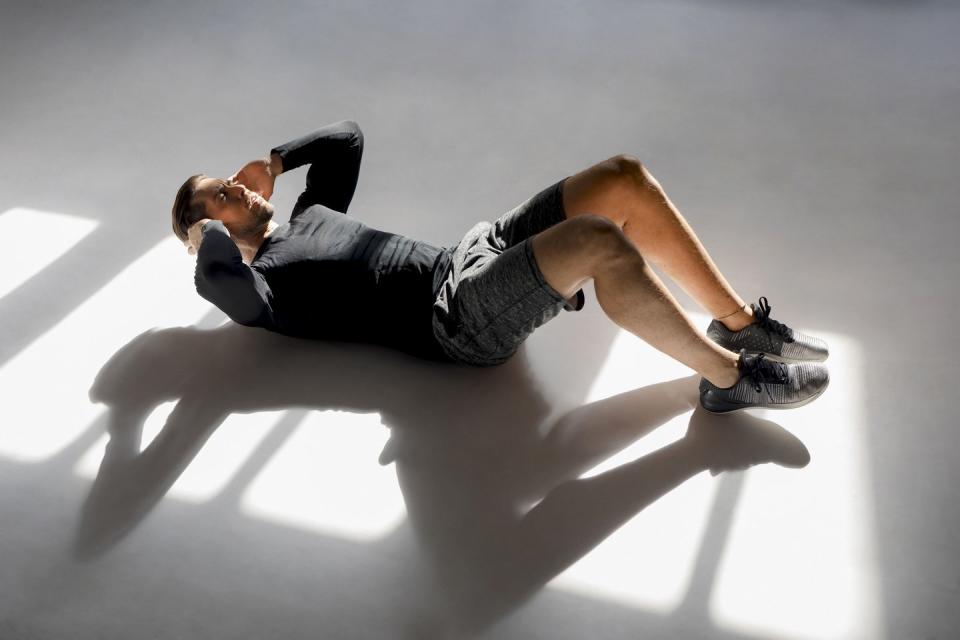24 Trainers, Doctors, and Nutritionists Shared Their Best Advice for Staying Fit at Home

With our everyday lives dramatically transformed almost overnight, “self-care” has gone from nice-to-have indulgence to must-have necessity. Of course, safeguarding your physical and mental health has alway been fairly vital, by its nature. But rarely has it been so universally pressing a concern or, thanks to restricted movement and rampant fear, as difficult – even with a constant stream of at-home workout videos.
We don’t want to give you more things to feel bad about not doing. You don’t have to hammer yourself with HIIT, or bathe in CBD, or build a Fortress of Solitude from “healing” crystals. You don’t have to personally optimize. You do, however, have to look after yourself, because – well, because. And if you don’t, then you can’t look after anybody else. So here are 24 things that you can do for your wellbeing. Don’t worry if you can’t do them all. In fact...
1. Focus on what you can do
“You can't control the coronavirus. You can control exercise, diet, sleep, calling friends – positive behaviors that we wish we did more of. And reward yourself for doing them by self-administering dopamine, a molecule released when you hit a goal, which in turn motivates you to repeat those behaviors and makes them easier to do. This can be as simple as telling yourself well done for going for that run or not eating that chocolate. It sounds a bit cringe, but it works – our collaborator Andrew Huberman, a neuroscientist at Stanford University, says so.” — Charles Oxley, performance coach, Power Speed Endurance
2. Stay active
“It’s not about pressuring yourself into having the perfect physique: it’s about engaging your mind and switching off from WFH for a second. Even more than your body, your brain needs this workout right now. It’s your most important ‘muscle’ – take care of it.” — Sandy Macaskill, co-founder, Barry’s Bootcamp UK
3.Go for a walk
“Physiology is psychology and the simple act of putting one foot in front of the other changes your internal chemistry to close the spiraling stress cycles. Remove your headphones, breath through your nose and let your brain process thoughts. It may be hard to slow down, but push through and you'll find solutions and clarity on the other side.” — Chevy Rough, wellbeing specialist and Campaign Against Living Miserably ambassador
4. Learn to run
“Chances are you never learnt that skill, read that book or started that fitness regime because you didn’t have the time. Not any more. It might seem silly to suggest learning to run when cooped up at home. However, some of the most basic and under-utilized components to running are strengthening the right areas and making sure that you’re mobile enough. So spend some of that newfound time on calf raises, reverse lunges and hamstring stretches. And if you are lucky enough to get outside, start by alternating one minute running and one minute walking for a total of 20 minutes.” — Ollie McCarthy, PT and CALM coach

5. Pattern up
“If I’m working out with no equipment, I’ll typically think of the movement patterns available to me: upper-body push (eg press-ups, narrow- or wide-hand press-ups, spider-man press-ups), squat (eg pistol, lateral), lunge (eg split squat, wide- or narrow-stance squat), core (planks, side planks, V-sits). I’ll pick one exercise for each pattern and a number of reps per move per round, then set a timer for 20-40 minutes and do as many rounds as possible.” — Jonathan Dick, personal training manager, Equinox Kensington
6. Socialise at a distance
“We're trying to keep physical distance – there's no reason why we can’t still be socially close. And maintaining face-to-face interactions is paramount for mental wellbeing. So while you might be having Zoom calls with your colleagues or accountant, harness the power of telecommunications to stay in touch with your friends and family too. Pick back up with an old acquaintance, have a beer with your mates or play bridge with Grandma – all through the wondrous HD cameras that we have at our fingertips. Seeing familiar faces in a lockdown can, like the virus, remind us that we’re all connected.” — Damian Soong, CEO and founder, Form Nutrition
7. Buy a kettlebell
“If you’re looking to be fit, functional and dynamic. the kettlebell is probably the most underrated and overlooked piece of equipment. It can be used for a wide variety of exercises at all levels of fitness, from deadlifts to hip thrusts, Turkish get-ups to farmer’s walks around your flat.” — Kristian Phillips, PT, Equinox Kensington
8. Sit on the floor
“I use floor-sitting positions to help maintain my athleticism and keep me ‘grounded’ – in my body. Whether you’re working on your computer or bingeing on Netflix, put on some comfortable clothes that you can move in. Every 25 minutes, drop into a squat and spend some time switching between different ground-rest positions eg a double-leg kneel, single-leg kneel, shin box. These help to reinforce a strong superstructure and ‘rewild’ your posture." - Tony Riddle, The Natural Lifestylist (who ran from Land’s End to John O’Groats, almost 900 miles, in 30 days and no shoes)

9. Feed your good bacteria
“Evidence suggests that the more diverse the community of bacteria in your gut, the more robust you’ll be. But you’re stuck indoors, you’ve been ordered to only go out for food when it’s essential and you’re worried about your finances – healthy food is expensive, isn’t it? Well, shop from this varied, inexpensive, long-life list: frozen fruit such as dark-colored berries; frozen veg such as spinach, peas and sweetcorn; fresh veg such as onions, leeks and garlic; starchy carbohydrates such as oats and tinned lentils. Ramp up your intake of real food and support your immune system.” — Matt Gardner, registered nutritionist and host of the Big Feed Up HQ podcast
10. Breathe like a baby
“We’re all born with the ability to breathe well. As we get older, though, we often get into bad habits as we're exposed to more and more stress. We live too fast. We think too fast. We breathe too fast. But if you learn to breathe more slowly, in a controlled way, you can reduce the effect of stress and cope better. Breathe from your belly (which is 20 per cent more energy efficient), through your nose (which filters out particles in the air) and out a little more than in (which stimulates your relaxation response). Inhale for four seconds, exhale for six. Repeat until you feel better.” — Michael Townsend Williams, author and co-founder of Do Breathe
11. Write a daily to-do list
“Without goals, we can quickly become listless, dissatisfied, even depressed. Writing a daily to-do list will give focus to your day, keep you on a constructive path and help you feel happier and more satisfied. You can put a mixture of things on the list: work, chores, exercising, reading, calling a friend and so on. The best thing about goals, however, is that you don’t have to achieve them all. It’s more about the direction than the accomplishment.” - Daniel Fryer, psychotherapist and author of The Four Thoughts That F*ck You Up… And How to Fix Them
12. Stay strong
“Strength is the cornerstone of all forms of physical activity. It makes your body more resilient to HIIT and running, increases mobility, decreases injury risk, improves hormonal health, bolsters bone density and generally makes you better at life. You should still be strength training two to three times a week, and those sessions should consist of the fundamental movement patterns of squat, hinge, push, pull and lunge. If you can’t add significant external load, ie the weights your gym has, work at a much slower tempos, focusing on range and technique: research supports isometric training – contracting a muscle in a fixed position – for preserving strength. As well as being the most important element of your fitness, strength is also one of the most resilient, and should stick around for around four weeks after you stop training. So don’t panic and do what you can to keep pushing that four weeks further out in front of you. Flatten your own curve.” — Luke Worthington, PT to Hollywood A-listers and professional athletes
13. Set your body clock
“Focus intensely on supporting your circadian rhythms. Being cooped up inside means more time on electronic devices, stressed-out late nights and lack of light exposure. So getting some blue light during the day could help – even looking out a window or sitting on a porch, if government regulations prohibit being out other than that. And setting a strict time to end computer, phone and tablet use can help improve sleep quality and melatonin secretion.” — Kamal Patel, co-founder, examine.com
15. Embrace digital minimalism
“The goal of this philosophy is to focus your technology use exclusively on activities that support your values. Digital minimalists might set up regular video conferences with family and friends, for example, or use local mailing lists to find ways to be helpful in their community. They wouldn’t, however, obsessively browse headlines, or yell at public figures on Twitter. We have two choices in this trying period: use new technologies to amplify our efforts to live a life we’re proud of, or allow them to suck us into a vortex of distraction and anxiety.” — Cal Newport, professor of computer science and author of Digital Minimalism
15. Don’t work at the dinner table (or eat at your desk)
“It’s all too easy to make lunch, go back to where you’ve been working all morning and eat while doing e-mails. Stress affects digestion: when you’re in fight-or-flight mode, your body moves blood from the gut to working muscles and the brain. Eating in a relaxed environment helps to activate your parasympathetic, ‘rest-and-digest’ nervous system. Take 15 minutes at meal times minus any distractions, chew your food and be mindful.” — Liam Holmes, performance nutritionist and founder, pH Nutrition
16. Do hollow-body holds
“My go-to exercise to do every day. Building core strength and endurance, shaping your body as one whole, is not only great for your appearance and posture but also its health. Lie on your back with your arms by your side and legs bent. Press your lower back into the floor by drawing your belly button down and in. Lift your shoulders off the floor by elongating your spine and actively contracting your abs and also your feet, and then hold that position. It may not seem like much on paper (or screen), but see for yourself.” — Carl Martin, personal training manager, Equinox UK
17. Keep a journal
“With a pen and paper. Journaling calms racing thoughts, gives us a break from our screens, provides useful memory jogs for when this is all over and helps us connect to our feelings. A good way in is to ask yourself: ‘How do I feel right now?’ And then ask: ‘Why?’ This opens up a sort of inner conversation that throws light on what’s really going on inside you. When I write my diary I’m often surprised by what comes out. I keep it handy and whether I write two sentences or twenty pages doesn’t matter. The frequency doesn’t matter either. It’s also reassuring to know it’s there and I can turn to it whenever I want. The end of the day is a good time to write – I find it helps me sleep, particularly if I write down a problem or something causing me stress.” — David Waters, therapist and coach
18. Reset your spine
“Your new working-from-home set-up may be less than optimal biomechanically. But forcing an upright posture doesn’t work. Instead, actively promote your joints’ ability to move – try this spine exercise. Sit forward slightly on your chair, away from your back rest, and roll your pelvis forward. Keeping your head stacked on top of your ribcage, feel the gentle extension or arch in your back. Then reverse, feeling the pull on the bottom of your spine and slouching along the whole length. Repeat four or five times. By doing this, you'll find yourself more upright and balanced naturally, as your brain has become aware of a wider range of possibilities to align your body. As a bonus, you’ll promote fluid transfer to stagnant areas and, for a moment, disconnect from your devices while reconnecting with yourself.” — Dominik Koch, movement therapist, Decrypt Bodywork
19. Look for opportunities
“We learned from living and working in Syria that fixating on survival can actually be suicidal. Rewiring your mindset becomes essential. Yes, times will become tougher. Yes, the negatives will become so much easier to dwell on. But that should never stop you from relentlessly pursuing opportunities, no matter what. If we found opportunities in Syria during its horrendous war, you probably can too, no matter where you are.” — Louai Al Roumani, former CFO and strategist at Syria’s leading bank and author of Lessons From A Warzone: How To Be A Resilient Leader In Times Of Crisis
20. Meditate
“Meditation is not about banishing the trials and tribulations – we practice so that when the bad days inevitably come, we have built some resilience. Returning our attention to the present shrinks the brain’s fear centre, the amygdala. And when we are present, often we will discover that many of our problems are imaginary, freeing up time and energy to deal with real issues that may be at hand. The breath is always arising in the present, so use it as an anchor. Each time you find your attention wandering, bring it back to the next breath. Don't be concerned if thoughts are persisting. Be patient. Remember, this is a ‘practice’.” — Michael McCaffrey, founder, Breathing Space Wellness
21. React with military efficiency
“As a Royal Marines Commando, I found it imperative to seek clarity in a stressful or hostile situation immediately. This was done by following a simple strategy called ARA. First, you must Accept that the situation has happened. Second, try to Remove unwanted emotions such as stress, fear and worry. (Less TV and social media will help.) Lastly, adapt as quickly as you can and make a new norm. You’ll find it far easier to process the situation, no matter how big the challenge.” - Ben Williams, author of Commando Mindset: Find Your Motivation, Realise Your Potential, Achieve Your Goals
22. Take cold showers (slowly)
“Gradually building up is a way to boost white blood cell production from cold exposure without the risk of overdoing it that potentially comes with intense immersion like an ice bath. And managing your stress response can be a useful tool for your mental stability. Week one, finish by washing cold (not lukewarm) water over your arms and legs for a total 30 seconds. Week two, over your arms, legs and chest for a minute. Week three, 30 seconds of cold at the start, in the middle and at the end. Week four, a minute at the start and end. Week five, cold shower – easy. The objective is to calm yourself down when the cold water hits. Focus on inhaling through your nose and prolonging your exhale through your mouth, like blowing through a straw. If you can control your breathing, you’re getting closer to controlling your mind.” — Artur Paulins, breathwork coach, founder of Breathwork Academy

23. Be optimistic
“Looking on the bright side is powerful preventative medicine. An optimistic outlook has been shown to boost the immune system and help recovery from illness. Studies indicate that there is a strong relationship between optimism and antibody responses to viruses, overall lower risk of disease and fighting the inflammatory effects of stress. Being told to be more positive right now might feel annoying, and impossible, but there are proven, no- or low-cost steps you can take: meditation and mindfulness, writing a journal about what you’re grateful for, connecting often with positive people. (Both positivity and negativity are infectious.) Or the ‘best possible self’ visualisation exercise: vividly envisage yourself at a future time point that is the rosiest possible (and feasible).” - Beth McGroarty, research director, Global Wellness Institute
24. Read history books
“Churchill talked, as WWII was breaking out, of the solace of putting 1,000 years between him and the present moment. He was talking about reading ancient history. It's good advice for us today, I think. I find a lot of solace in reading the Stoics – particularly Marcus Aurelius – who went through plagues and wars and civil unrest, and worried and feared and were angry like us. But they got through it. They survived. It's somewhat easier and more reassuring to study history than it is to mainline breaking news.” — Ryan Holiday, author of Stillness Is The Key
You Might Also Like
